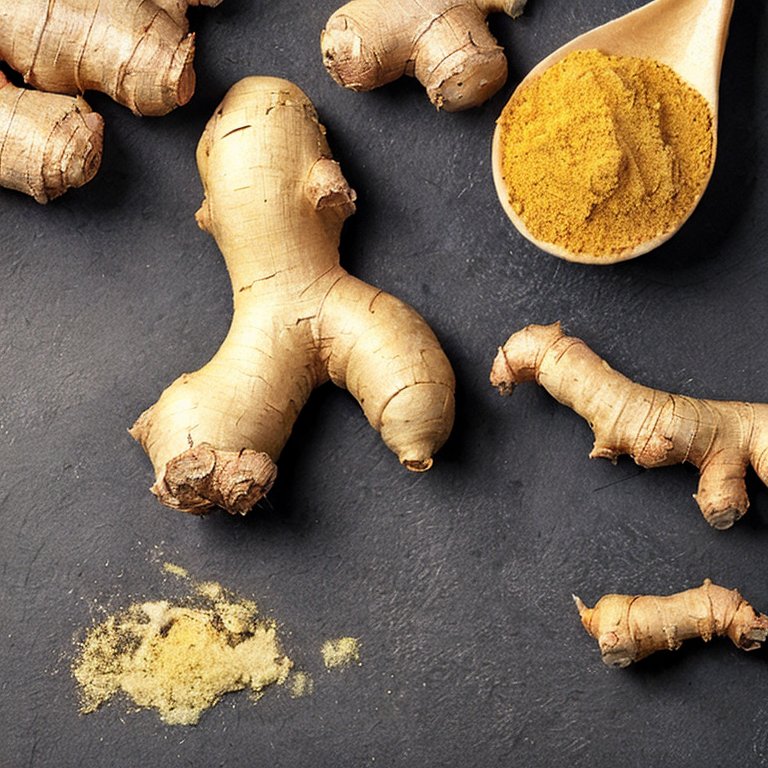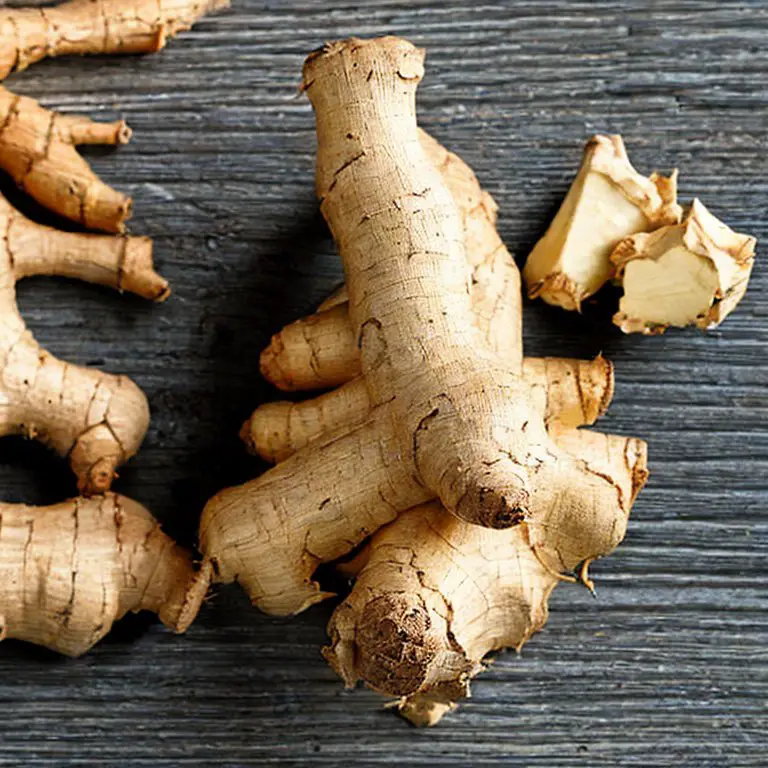Ginger is a flavorful and aromatic spice that is widely used in cooking and is known for its numerous health benefits. However, if you follow a low FODMAP diet, you may be wondering whether ginger is a suitable ingredient for you.
In this post, we will explore the FODMAP content of ginger and consider its suitability for those following a low FODMAP diet.
- What are FODMAPs
- Is Ginger Low FODMAP?
- Is Ginger Tea Low FODMAP?
- Is Ginger Ale Low FODMAP?
- Is Ginger Good for IBS?
- Ginger Benefits
- How to Use Ginger on a Low FODMAP Diet
- Final Thoughts
What are FODMAPs
FODMAPs are short-chain carbohydrates that are poorly absorbed in the small intestine and can cause digestive symptoms in some people, especially those with irritable bowel syndrome (IBS) or other digestive disorders.
The low FODMAP diet is a dietary approach that involves eliminating high FODMAP foods from the diet in order to manage these symptoms.
Is Ginger Low FODMAP?
In general, ginger is considered to be low in FODMAPs and is considered a safe choice for people following a low FODMAP diet. However, it’s important to keep in mind that the FODMAP content of ginger can vary depending on the form in which it is consumed. For example, fresh ginger is generally lower in FODMAPs than dried ginger, and ginger tea is lower in FODMAPs than ginger-flavored drinks or other ginger products.

It’s also worth noting that while ginger is low in FODMAPs, it can be irritating to some people with digestive issues, so it’s important to be mindful of your individual tolerance. If you are following a low FODMAP diet and are considering adding ginger to your diet, it’s a good idea to speak with a registered dietitian or your healthcare provider to determine the appropriate amount and form of ginger that is suitable for you.
In terms of serving size, the Monash University Low FODMAP Diet app lists fresh ginger as low FODMAP in servings of up to 1 tablespoon (5 grams) per serving. Dried ginger is considered low FODMAP in servings of up to 1 teaspoon (2 grams) per serving. It’s important to note that these serving sizes may vary depending on the specific product and the way it is prepared.
Is Ginger Tea Low FODMAP?
Ginger tea is a popular beverage that is made by steeping ginger slices or ginger powder in hot water. It is known for its distinctive flavor and potential health benefits, including digestive support and antioxidant properties. If you follow a low FODMAP diet, you may be wondering whether ginger tea is a suitable choice for you.
In general, ginger is considered to be low in FODMAPs and is considered a safe choice for people following a low FODMAP diet. However, it’s important to keep in mind that the FODMAP content of ginger can vary depending on the form in which it is consumed. For example, fresh ginger is generally lower in FODMAPs than dried ginger, and ginger tea is lower in FODMAPs than ginger-flavored drinks or other ginger products.
The Monash University Low FODMAP Diet app lists ginger tea as low FODMAP in servings of up to 1 cup (250 ml) per serving. It’s important to note that these serving sizes may vary depending on the specific product and the way it is prepared.
It’s also worth noting that while ginger is low in FODMAPs, it can be irritating to some people with digestive issues, so it’s important to be mindful of your individual tolerance. If you are following a low FODMAP diet and are considering adding ginger tea to your diet, it’s a good idea to speak with a registered dietitian or your healthcare provider to determine the appropriate amount and form of ginger tea that is suitable for you.
Ginger tea is a simple and soothing way to enjoy the potential health benefits of ginger. It can be enjoyed on its own or sweetened with a low FODMAP sweetener such as honey or maple syrup. Ginger tea can also be flavored with other low FODMAP herbs and spices, such as mint or cinnamon, to add additional flavor and potential health benefits.
Is Ginger Ale Low FODMAP?
Ginger ale is a carbonated beverage that is flavored with ginger and is often used to help alleviate digestive issues. If you follow a low FODMAP diet, you may be wondering whether ginger ale is a suitable choice for you.
In general, ginger is considered to be low in FODMAPs and is considered a safe choice for people following a low FODMAP diet. However, it’s important to keep in mind that the FODMAP content of ginger can vary depending on the form in which it is consumed. For example, fresh ginger is generally lower in FODMAPs than dried ginger, and ginger tea is lower in FODMAPs than ginger-flavored drinks or other ginger products.
It’s worth noting that while ginger ale may contain ginger, it is typically made with artificial flavors and other ingredients that may not be suitable for a low FODMAP diet. Many ginger ales also contain high FODMAP ingredients such as high fructose corn syrup, which can cause digestive symptoms in some people.
If you are following a low FODMAP diet and are interested in incorporating ginger into your diet, it’s a good idea to choose forms of ginger that are low in FODMAPs and do not contain high FODMAP ingredients. Fresh ginger, dried ginger, and ginger tea are all generally considered to be low FODMAP options.
Is Ginger Good for IBS?
Irritable bowel syndrome (IBS) is a common gastrointestinal disorder that can cause symptoms such as abdominal pain, bloating, and changes in bowel movements. While there is no cure for IBS, dietary modifications and lifestyle changes can often help manage symptoms. Some people find that incorporating ginger into their diet may help alleviate their IBS symptoms.

Ginger is a popular spice that is known for its anti-inflammatory and digestive properties. It has been used in traditional medicine for centuries to treat a variety of ailments, including digestive issues. Some studies have suggested that ginger may have the potential to reduce the severity and duration of certain types of nausea and vomiting, and it may also have a positive effect on digestive symptoms such as bloating and gas.
However, it’s important to note that the evidence supporting the use of ginger for IBS is largely anecdotal and more research is needed to confirm its effectiveness. Some people with IBS may find that ginger helps alleviate their symptoms, while others may not experience the same benefits.
Ginger Benefits
In addition to its potential benefits for digestive health, ginger has a number of other potential health benefits. It has been shown to have anti-inflammatory and antioxidant properties, and it may have a positive effect on blood sugar control, heart health, and other conditions. Some studies have even suggested that ginger may have the potential to reduce the severity and duration of certain types of nausea and vomiting.
How to Use Ginger on a Low FODMAP Diet
Ginger is a versatile spice that can be used in a variety of dishes, including soups, stews, marinades, and baked goods. It can also be enjoyed as a tea or added to smoothies and other beverages. If you are following a low FODMAP diet and are interested in incorporating ginger into your meals, there are many delicious and creative ways to do so.
For example, you can add grated or minced fresh ginger to stir-fries, curries, and other savory dishes. You can also use ground ginger in baking recipes or in rubs and marinades for meats and vegetables. Ginger tea is a simple and soothing way to enjoy the benefits of ginger, and you can make your own by steeping fresh ginger slices in hot water for several minutes.
Final Thoughts
In conclusion, ginger is a flavorful and aromatic spice that is widely used in cooking and is known for its numerous health benefits. It is generally considered to be low in FODMAPs and is a safe choice for those following a low FODMAP diet.
However, it’s important to pay attention to serving sizes and individual tolerance, and to consult with a registered dietitian or healthcare provider if you have any concerns. In addition to its potential benefits for digestive health, ginger has a number of other potential health benefits and can be enjoyed in a variety of dishes and beverages.
Whether you are looking to add some flavor to your recipes or hoping to benefit from its potential health properties, ginger can be a delicious and nutritious addition to your diet.
Lance has been passionate about the plant-based diet and we have been following a whole food plant-based diet for over 5 years. We focus on health, natural healing, weight management, animal rights, and the health of the planet and environment by focusing on whole plant-based foods and sustainable practices.
Learn more at the About Me page and follow on social media at the links below.

